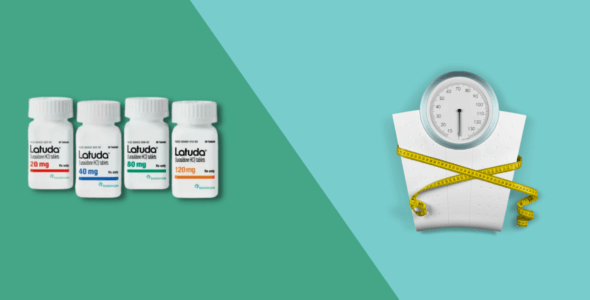Latuda and alcohol: can they be used together?
Table of contents
Alcohol use can make it extremely challenging to control the symptoms of schizophrenia and bipolar disorder. Studies have shown that people with these medical conditions struggle significantly more with substance abuse. Latuda can help with schizophrenia and bipolar disorder but when taken with alcohol the side effects are amplified leading to possible life-threatening situations. Medical professionals advise against mixing the two substances. Read on to gain a better understanding of why it’s not a good idea to mix the two.
What is Latuda?
Latuda is the brand name of a prescription drug called lurasidone. It belongs to a class of drugs called atypical antipsychotics and is indicated for the treatment of bipolar disorder. Atypical antipsychotics are used in adults, alone or in combination with mood stabilizer drugs such as lithium or valproate. Other antipsychotic drugs in this drug class include quetiapine (Seroquel), and aripiprazole (Abilify).
Latuda is an FDA-approved atypical antipsychotic medication to treat two mental health conditions:
- Depressive episodes related to bipolar 1 disorder
- Schizophrenia
The dominant symptom of bipolar I disorder is manic episodes that last 7 days which may or may not lead to hospitalization. Also, a depressive episode referred to as bipolar depression lasting typically two weeks will normally occur. These manic and depressive episodes can happen separately or at the same time.
In children, 10 years of age and older Latuda is approved to treat major depressive episodes related to bipolar depression. For this purpose, Latuda may be used alone. Studies show that antidepressants may increase the risk of suicidal thoughts and behaviors in children and young adults.
- Schizophrenia
Schizophrenia is a serious mental illness that changes how a person thinks, feels, and behaves. People with schizophrenia experience hallucinations, disordered thoughts, and delusions. Latuda is approved to treat adults and adolescents ages 13-17 years of age with schizophrenia. It is not approved for use in older adults with dementia-related psychosis due to an increased risk of death.
What are the side effects of Latuda?
The most serious side effects of Latuda include:
- Tardive dyskinesia (uncontrollable slow or jerky movements)
- Low white blood cell count
- Increased prolactin levels causing missed periods in females
- Neuroleptic malignant syndrome
- Changes in your metabolism can lead to high blood sugar levels, high levels of cholesterol or triglycerides, and weight gain
The most common side effects of Latuda include:
- Muscle stiffness
- Drowsiness
Drug interactions and supplements
Latuda can interact with different types of drugs. These drugs include:
- Antifungal medications such as fluconazole
- Antibiotics such as erythromycin (to treat bacterial infections)
- Heart medications such as diltiazem (Cardizem) and verapamil (Isoptin) for the treatment of high blood pressure
- Mood stabilizers like carbamazepine (Tegretol) and lithium
- Grapefruit and grapefruit juice can increase Latuda concentrations in your body
- St John’s wort can reduce the amount of Latuda in your body.
This is not a complete list of drug interactions for Latuda. Consult your healthcare provider for medical advice and tell them about all the medicines you take, including prescription and over-the-counter medicines, vitamins, and herbal supplements.
Is Latuda safe in pregnancy and breastfeeding
It’s not known if Latuda can pass into breast milk. If you’re breastfeeding or planning to breastfeed, or are pregnant or planning to become pregnant speak with your doctor about the risks and benefits of using Latuda.
What can happen if I drink alcohol with Latuda?
Alcohol and Latuda have many common side effects because they are both central nervous system depressants. Alcohol can cause a worsening of symptoms and side effects of bipolar disorder or schizophrenia. You are at increased risk of some of the following side effects when you combine the two:
- Low blood pressure
- Reduced heart rate
- Reduced rate of breathing
- Fall in body temperature
- Fainting or sedation
- More likely to fall
- Seizures
The clinical studies of Latuda do not include people with a history of alcohol abuse which means no data showing the specific interaction between Latuda and alcohol use exists. According to Lupin Pharmaceuticals the manufacturers of Latuda, people should avoid drinking alcohol as it may worsen the side effects of Latuda. If you take atypical antipsychotics, talk with your healthcare provider before drinking any alcohol.
Medically reviewed
A medical professional has reviewed this article.


Jamie Winn, PharmD
Jamie Winn, PharmD
Dr. Jamie Winn received his Doctor of Pharmacy in 2002 from the University of South Carolina College of Pharmacy, Columbia, SC. Jamie is a medical reviewer for NiceRx.




